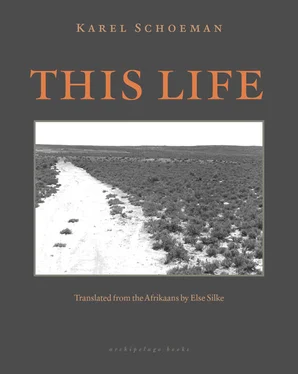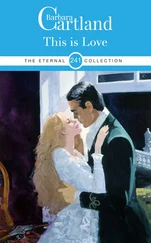For a long time we could go nowhere and it was safe nowhere, and Maans suggested a bit hesitantly that it might be better if I did not wander about in the veld on my own as was my habit. More than that he did not say; but afterwards I usually went out when he was not at home to worry about me. To me it was different, however, as if the earth and the veld I had known all my life had suddenly changed, as if the familiar places had suddenly become treacherous and the familiar land could no longer be trusted, glistening and dangerous as a yellow cobra slithering away among bushes and rocks. Some of the young men in our district joined the commandos and some of them were shot dead in skirmishes, or sometimes one of them was caught and executed as a rebel, young men I scarcely knew, though their parents or grandparents were of my own generation. In our isolation our only information came from the herdsmen who brought us news of these battles and executions, and the servants knew more about the movements of the commandos and the troops than they ever told us.
Something had changed and when the war was over, life was not the same. Maans returned to Parliament in Cape Town, but he was past fifty and his hair was quite grey: sometimes, when I noticed how old and tired he looked, I was suddenly reminded of the child I had piggy-backed and raised alone, and the schoolboy who had wanted to become a soldier. Did he remember the water glittering in the sunlight among the reeds, I sometimes wondered; was there a vague memory from his childhood of tears pouring down my cheeks as I knelt in the veld, and did he ever wonder uneasily where this obscure image came from or what it meant? Or had even that been forgotten?
What would have happened if Father had allowed him to leave? Would he have been happier now, or unhappier? Who can tell? Stienie spent even less time at home during these years, for she often complained of her health and said she had to stay in Cape Town to be close to the doctors who could treat her, or else she would be somewhere at the seaside, or at the baths at Goudini or the sanatorium at Caledon. When she was at home, she was restless and unhappy, and the only time she seemed content for a while was when visitors came over or she could find a reason to entertain. Her eyes remained restless and searching and her voice took on a sharp and whining tone. As she grew older, she gained weight and she dressed more and more outrageously in clothes she brought with her from Cape Town: she had always been a little grand for us but dare I say she now became flamboyant, with her gussets and frills and trains, the hats with their flowers and ribbons and veils and large hat pins and the ostrich feathers — Stienie had always loved ostrich feathers. Where people used to smile good-naturedly about her dress style before, their remarks were less charitable now, and especially the women were quite vicious at times. Oh, it was mostly the younger people who did not know her well who were less than kind in their opinions and quicker to appoint blame and pass judgement, and they sometimes made her seem more ludicrous than she really was.
Maans continued to be as well-respected as always, but yet there was a new sharp edge to people’s feelings towards him that had not been evident before, for the war had brought discord to our district, and certain people felt he had collaborated too well with the government, while others thought he had been too friendly with the commandos on the farm. Where people had teased him for years about having so little to say in Parliament, he was now blamed by some for not contributing enough, and by others for what he said when he did speak. I heard him being disparaged, in the kitchen I overheard the words, in the passage where the door stood ajar, at the fringe of the company, behind the backs of those who had forgotten about me, as usual, and with increasing certainty I knew that he could no longer count on the same affection and trust as earlier. What had happened? I did not know myself, for it was something from outside, that bright serpentine path of gold, flashing in the sun, making its way across the faded landscape.
In the end Maans himself became aware of these feelings. He might never have become involved with politics had it not been for Stienie, and had it not been for her, he would probably also have retired a long time ago, for the duties and responsibilities and the long absences from the farm had become an increasingly heavy burden for him, and it became clearer from one year to the next how reluctantly he shouldered it. However, each time he mentioned retiring, Stienie interrupted with that quick motion of her head and shoulders, and laughingly made some deprecating remark to show he did not really mean what he was saying; but at last, when there was talk about a Union, he said he would stay on only until the new Parliament had been elected, and this time Stienie did not interrupt, but listened to his words in silence, staring at her rings as if she had no interest in his decision. He had grown old, this child I had raised, and there was more silver than black in his hair; when I looked up at his words and saw him like that in the lamplight, I was suddenly afraid, as if I had just been reminded how quickly the years had passed. And if Father had allowed him to become a soldier when it had been his one desire, would it really have made a difference?
I could look across the table in the lamplight and see; I could stand in the dim light of the passage or in the voorhuis behind the lined curtain, and hear — that was all. There was nothing I could do to prevent anything, or to change the course of events, and over the years I had withdrawn so far from these affairs that no sense of involvement remained. I still went in to town for Nagmaal and attended church services with Maans and Stienie but afterwards, when the house was filled with visitors, I began taking the liberty of withdrawing from the company, and if people initially noticed my absence, they soon became used to it. On the farm I gave orders in the kitchen when guests arrived and saw that coffee was served in the voorhuis, but I never joined the company any more, and though at first Stienie had frowned at my lack of manners with that impatient little shrug of her round shoulders, she did not say anything, and in all honesty there was no one among the visitors who requested my company or who missed me.
Once I attended a wedding with Maans and Stienie unwillingly, the silent and disregarded guest at the fringe of the merriment, and I heard the women clustered together in the light of the chandelier discussing Stienie over their glasses of sweet wine. “Yes,” one of them remarked disapprovingly, “Maans is seldom at home these days. His mad old aunt looks after the farm for him.” I no longer remember who spoke those words, I do not even recall whose wedding it was or where it took place; I just remember being seated in the shadowy corner and hearing that observation that no one contradicted, and then the sudden silence that fell when they realised I had been sitting there all the time and had overheard their conversation. For a moment the yawning abyss returned and I found myself on the opposite side once again, almost indistinguishable in the distance; but then they quickly changed the subject, and where I sat, excluded from their circle, I was overwhelmed by the realisation of my own freedom. After this I deemed it unnecessary to attend any more weddings or funerals in the district. I still went in to Nagmaal with Maans and Stienie and attended church with them, but my last discernible connection with the people around us had been severed.
When I was a child, we had no mirror in the house and thus I never had the chance to see my own face. In these years I learned to live without mirrors again, as I had no further need of them, for I knew very well what I looked like: a dishevelled old woman, no longer capable of sensible conversation or any form of intercourse with her neighbours, unsociable and slow of speech, with a peculiar scar across her forehead, scorched by the sun, tousled by the wind, half-wild as a result of her strange and isolated existence. That was all; and this is all that has finally remained: an old woman alone in a bed in a dark room, voiceless and paralysed, so far retreated into herself that no return to life is possible any more. All.
Читать дальше












